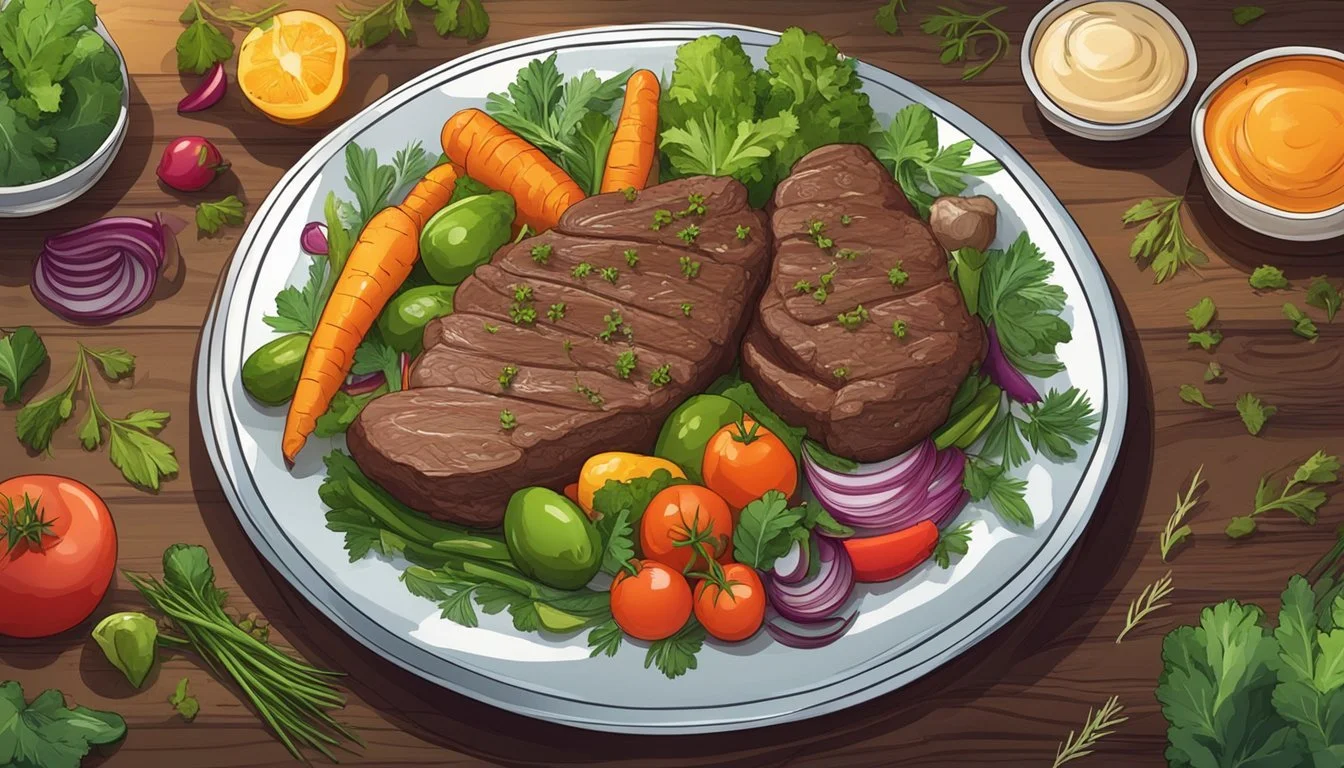7 Carnivore Diet Tips for Better Skin Health
Achieve Radiant Results
The carnivore diet has gained attention for its potential benefits on skin health, drawing interest from those who struggle with various skin conditions. Proponents of this diet report improvements in acne, eczema, psoriasis, and rosacea, attributing these positive changes to the elimination of inflammation-inducing foods and the inclusion of nutrient-dense animal products.
Adopting the carnivore diet may lead to clearer, healthier skin by providing essential nutrients such as omega-3 fatty acids, zinc, and vitamins A, D, and B12, which are crucial for skin health. Additionally, the diet's simplicity and focus on high-quality animal fats might support overall bodily functions, consequently enhancing skin appearance and resilience. This article will offer seven practical tips to help maximize these skin health benefits while following a carnivore diet.
1) Incorporate Grass-Fed Beef into Your Diet
Choosing grass-fed beef can be beneficial for skin health. Grass-fed beef is higher in omega-3 fatty acids and antioxidants compared to grain-fed beef. These nutrients are known to help reduce inflammation, which can lead to clearer skin.
Grass-fed beef also contains more vitamins like vitamin E, which protects skin cells from damage. Additionally, the higher levels of conjugated linoleic acid (CLA) found in grass-fed beef can support overall skin health.
It's important to select meat that is labeled as grass-fed and grass-finished to ensure you're getting the maximum nutritional benefits. Consuming grass-fed beef can be a great way to improve the quality of your diet, which in turn, supports healthier skin.
Making grass-fed beef a regular part of your meals can provide the necessary nutrients to keep the skin looking healthy and vibrant. It's an easy way to incorporate skin-nourishing elements into a carnivore diet effectively.
2) Consume Oily Fish Like Salmon for Omega-3s
Oily fish such as salmon are a rich source of omega-3 fatty acids, which are crucial for skin health. Omega-3s help reduce inflammation, which can combat acne and redness.
Regular intake of omega-3s can also help maintain skin hydration by supporting the barrier function. This makes the skin less prone to dryness and irritation.
Salmon, mackerel, and sardines are particularly high in omega-3s. Including these fish in your diet a few times a week can significantly boost your omega-3 intake.
Shellfish like oysters and mussels also contain beneficial omega-3 fatty acids. These can be a good alternative if you prefer a variety of seafood.
Omega-3s found in fish support not only skin health but also overall well-being. Prioritizing these foods can contribute to a more radiant complexion.
3) Add Liver to Your Weekly Meal Plan
Liver is a nutrient-dense organ meat that offers numerous benefits for skin health. It is rich in essential vitamins and minerals, including vitamin A, which is vital for maintaining healthy skin and promoting cell turnover.
Adding liver to your weekly meal plan can provide a concentrated source of nutrients. Vitamin A, in particular, helps to reduce acne and wrinkles by supporting skin regeneration.
Iron, another key component found in liver, contributes to better oxygenation of skin tissues. This can result in a more radiant complexion and quicker healing of any skin injuries or conditions.
Liver is also a great source of zinc, which has anti-inflammatory properties beneficial for reducing skin redness and irritation. Consuming liver regularly can help manage conditions such as eczema and psoriasis.
Implementing liver into your diet doesn't have to be complex. Thinly slicing liver and cooking it quickly in animal fat or butter ensures maximum nutrient retention while keeping preparation simple.
Incorporating liver into meals once or twice a week can make a significant difference in skin health. This practice ensures a regular intake of the vital nutrients necessary for maintaining clear, supple skin.
4) Stay Hydrated with Bone Broth
Staying hydrated is crucial for maintaining healthy skin, especially on the carnivore diet. Bone broth provides an effective way to support hydration while also offering numerous skin benefits.
Bone broth, made by simmering animal bones for several hours, yields a nutrient-rich liquid filled with collagen, amino acids, and minerals. These components help keep the skin hydrated, elastic, and resilient.
Collagen in bone broth is particularly beneficial for skin health. It supports skin structure and improves hydration, potentially reducing the appearance of fine lines and wrinkles. Many individuals on the carnivore diet find that incorporating bone broth into their daily routines helps them achieve a more youthful skin appearance.
In addition to collagen, bone broth contains essential minerals like magnesium, calcium, and phosphorus. These minerals support the body's various functions, including skin cell rejuvenation and repair.
Drinking bone broth regularly ensures that the body stays hydrated and receives a steady supply of these vital nutrients. It's a practical addition to the carnivore diet that can bolster overall skin health while keeping hydration levels in check.
Bone broth can be easily incorporated into daily meals or enjoyed as a soothing beverage. Whether consumed plain or used as a base for other dishes, bone broth is a versatile option for anyone focused on skin health while following a carnivore diet.
5) Use Ghee or Tallow as Cooking Fats
Ghee and tallow are excellent choices for cooking fats on the carnivore diet. Both are rich in essential nutrients and have high smoke points, making them ideal for cooking at high temperatures.
Ghee, or clarified butter, offers a rich flavor and is packed with vitamins A, D, E, and K2. It’s especially beneficial for those looking to boost their intake of fat-soluble vitamins.
Tallow, rendered from beef fat, provides a neutral flavor and is a great source of saturated and monounsaturated fats. These fats are stable under heat and can be used for frying, roasting, and slow-cooking without breaking down.
Using ghee or tallow can help maintain the nutritional integrity of your food, ensuring that you get the maximum benefits from your meals. They can also contribute to skin health by providing the necessary fats and vitamins for a healthy complexion.
Incorporating these fats into your diet can enhance the taste and texture of your dishes, while supporting your overall skin health.
6) Regularly Consume Organic Eggs
Incorporating organic eggs into a carnivore diet can enhance skin health. Organic eggs are rich in essential nutrients such as vitamins A, D, and E, which support skin regeneration and repair.
Eggs are also an excellent source of biotin, a B-vitamin crucial for maintaining strong and healthy skin. The high-quality protein found in eggs aids in collagen production, which keeps the skin firm and elastic.
Organic eggs contain beneficial antioxidants like lutein and zeaxanthin. These compounds help protect the skin from damage caused by ultraviolet (UV) rays and environmental stressors.
For best results, it's recommended to consume eggs from organic, pasture-raised sources. These eggs tend to have higher levels of omega-3 fatty acids, contributing to reduced skin inflammation.
Regularly including organic eggs in meals can contribute to a well-rounded carnivore diet, providing essential nutrients that nurture overall skin health. Organic options ensure that the eggs are free from harmful pesticides and chemicals, further benefiting skin well-being.
7) Avoid Processed Meats
Processed meats can negatively impact skin health. These foods often contain preservatives, additives, and high levels of salt, which can contribute to inflammation. Inflammation can exacerbate skin conditions such as acne, eczema, and psoriasis, making it important to avoid processed meats.
Avoiding processed meats also helps in maintaining the purity of one's diet. Many processed meats include sugars, fillers, and chemicals that can disrupt the balance of bacteria in the gut. A healthy gut is closely linked to clear and healthy skin, and minimizing these disruptions is beneficial.
Additionally, processed meats often have lower nutritional value compared to fresh, whole cuts of meat. Essential nutrients needed for skin health, such as zinc and vitamins, are more abundant in unprocessed, natural meats. Prioritizing fresh meats ensures a better nutrient profile for healthier skin.
For those on a carnivore diet, focusing on fresh meat sources such as beef, lamb, and poultry is crucial. These unprocessed options provide essential fats and proteins without the harmful additives found in processed meats. This approach supports overall skin health by reducing the intake of inflammatory substances.
Understanding the Carnivore Diet
The carnivore diet focuses exclusively on animal-based foods, emphasizing simplicity and high-protein consumption. This section will explore what the diet entails and the health benefits it offers through its nutritional profile.
What Is the Carnivore Diet?
The carnivore diet is straightforward: consume only animal-derived foods like beef, pork, lamb, poultry, fish, eggs, and limited dairy such as cheese and butter. There are no plant-based foods, grains, or sugars. The principle is to prioritize fatty cuts of meat to ensure sufficient calorie intake and satiety.
This diet is praised for its simplicity, eliminating the need for calorie counting or complex meal preparations. By focusing on nutrient-dense animal products, the diet aims to provide essential proteins and fats required for overall health and energy.
Nutritional Profile and Benefits
The carnivore diet is rich in proteins and fats, particularly saturated fats. These macronutrients are crucial for muscle repair, hormone production, and cellular function. High protein intake helps in keeping individuals full, which can lead to reduced calorie consumption and potential weight loss.
Potential benefits include:
Weight Loss: High protein keeps one satiated, aiding in calorie reduction.
Mental Clarity: Some followers report improved focus and cognitive function.
Skin Health: Limiting inflammatory foods may help alleviate conditions like acne, eczema, and psoriasis.
Drawbacks to consider:
Nutrient Deficiencies: Risk of missing key nutrients, such as vitamin C and fiber.
Cholesterol Levels: High intake of saturated fats may raise cholesterol levels.
Adherents should consider these points to understand the potential impact on their health comprehensively.
How the Carnivore Diet Affects Skin Health
The carnivore diet can impact skin health through nutritional intake and the elimination of certain foods. It typically leads to noticeable changes in skin conditions including acne, eczema, and inflammation.
Key Nutrients for Skin Health
The carnivore diet includes nutrient-dense animal products that are beneficial for skin health. Organ meats, such as liver and kidney, provide essential vitamins and minerals like iron, zinc, and vitamin A.
Iron aids in oxygen transport and cell regeneration, contributing to a glowing complexion. Zinc is crucial for skin repair and reducing inflammation. Vitamin A regulates cell growth and helps prevent acne.
Moreover, collagen-rich meats promote skin elasticity and hydration, while omega-3 fatty acids from fish help in reducing skin redness and irritation.
Common Skin Changes on a Carnivore Diet
Many adherents of the carnivore diet report improved skin conditions. People have seen a reduction in cystic acne, likely due to the elimination of inflammatory foods such as sugar and processed carbohydrates.
Conditions like eczema and psoriasis may also see improvement. The diet’s focus on high-quality fats supports moisturization and skin barrier function.
Additionally, detoxification effects occur, as the body eliminates toxins from processed foods. This can result in clearer skin and less inflammation. These changes are often noticed within weeks of starting the diet, indicating a potential direct link between diet and skin health.
Combining the Carnivore Diet with Skincare
Combining the carnivore diet with an effective skincare regimen can significantly improve skin health by reducing inflammation and supporting hydration. The following strategies are pivotal in achieving optimal results.
Selecting Complementary Skin Products
When following a carnivore diet, it is important to avoid skin products with harsh chemicals that may counteract the benefits of the diet. Opt for natural and gentle ingredients that align with the diet's philosophy of purity.
Look for products containing squalane or hyaluronic acid to maintain moisture.
Ceramide-based creams can enhance the skin barrier.
Fragrance-free products reduce potential irritation.
Using non-comedogenic products helps prevent clogged pores, especially for those who have seen a reduction in acne following the diet.
Lifestyle Adjustments for Enhanced Skin Health
In addition to dietary changes, integrating complementary lifestyle adjustments can lead to further improvements in skin health. Hydration is paramount; drinking enough water daily supports the benefits gained from the carnivore diet.
Regular exercise ensures improved blood circulation, promoting skin repair.
Adequate sleep is crucial for cellular regeneration and reducing stress, which benefits the skin.
Avoid excessive sun exposure, and use broad-spectrum sunscreen to protect against UV damage.
Such holistic approaches combined with the carnivore diet can make a noticeable difference in achieving clear and healthy skin.









